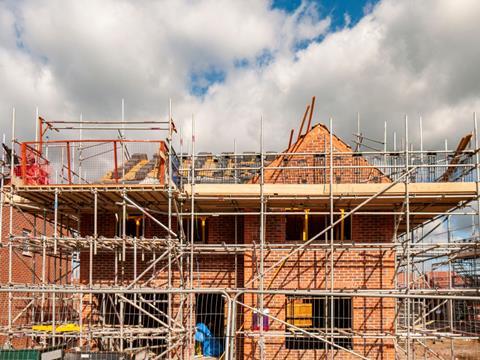Housing sector figures say the Government needs to help “get builders building” and support housing providers with decarbonising stock
The housing sector has welcomed the Government’s decision to increase the Local Housing Allowance (LHA) rate, however, industry figures have highlighted the “notable absence” of measures in today’s Autumn statement to increase housebuilding and decarbonise homes.

Housing sector figures cite “notable absence” of measures in autumn budget aimed at increasing housebuilding and decarbonising homes
In today’s autumn statement, Jeremy Hunt announced that in April 2024, the LHA rate will be restored to cover 30th percentile of homes available on the private-rented market, while Universal Credit will be increased by 6.7%.
The move has been welcomed by housing figures after organisations such as the G15, the Chartered Institute of Housing and the Local Government Association called on the government to increase the LHA rate.
Josie Parsons, chief executive of housing association Local Space, said that while the LHA increase is “positive news”, measures to mitigate the cost-of-living crisis “are still dwarfed by rapidly increasing housing costs and a lack of good quality new homes”.
Parsons added: “With levels of homelessness reaching some of the highest levels this century, and with a continuing shortage of social housing and a near collapse in housing supply in general, urgent measures are now required to get builders building and for councils to be able to meet this challenge of increased homelessness approaches. That means more social homes built and acquired to meet demand. As we head into winter this crisis will only get worse as supply tightens further and the numbers sleeping on our streets increase.”
Carol Matthews, chief executive of Riverside, welcomed shorter-term policy changes such as the increase in the LHA rate.
However, Matthews added: “There is a clear long-term need for the Government to commit to delivering more than 90,000 new homes a year for social rent and to ring-fence and increase long-term revenue funding for supported housing for people affected by homelessness. We will continue to urge all political parties to commit to build and fund more social and supported homes which are desperately needed across the country.”
The Home Builders Federation however was disappointed by the autumn Statement.
A spokesperson said: ”Following on from the Kings Speech, the autumn statement is another missed opportunity to address falling housing supply with policy intervention.
“No support for buyers, no meaningful measures to address the failing planning system, no real plan to build more homes.”
This was echoed by Helen Moore, group director of Orbit Homes, who said the government had not done enough to unlock housebuilding: ”The funding on nutrient neutrality mitigation measures tackles only a third of the homes stuck due to this issue and will inevitably take time to be implemented.
“The party conference commitments to reform planning and invest in planning teams disappointingly only apply to infrastructure projects not new homes. This leaves us with a planning system that remains slow and under resourced, with obstacles such as nutrient neutrality still holding up the delivery of the new homes our country so desperately needs.”
Fiona Fletcher-Smith, chief executive of L&Q and chair of G15, said: “We are pleased that Local Housing Allowance (LHA) will be restored to the thirtieth percentile, as the G15 called for. Uplifting LHA rates to current levels will reduce the affordability gap and prevent immediate and avoidable hardship for private renters.
On retrofit, Fletcher-Smith added: ”Notable in its absence from the Autumn Statement was any mention of additional measures to support the decarbonisation of Britain’s housing stock.
“We know that retrofit solves more than just the climate challenge, with a multitude of benefits stretching from lower bills for residents to economic opportunity for the country.
Autumn statement 2023
Hunt announces £110m nutrient mitigation fund to ‘unlock 40,000 homes’
Autumn statement 2023: Key measures at a glance
Chancellor raises Local Housing Allowance rates in autumn statement
Developers to be offered ‘premium planning service’ to speed up council decisions
”Housing associations are on average more energy efficient than any other homes, but we need long-term policy certainty if we are to reach net zero by 2050.”
Greg Reed, chief executive of Places for People, said he had hoped Hunt would announce the release of the full £3.8bn Social Housing Decarbonisation fund as called for by sector bodies including the Housing Forum and the National Housing Federation.
Reed said: ”This funding is crucial for us to kick on and retrofit more homes, and bring down bills as a result. Given the scale and urgency of this task nationally, we need more certainty around when the funding will be available so we can plan, alongside other affordable housing providers and the supply chain, to deliver the best outcome for people and the environment. Today is a missed opportunity.”
Nicholas Harris, chief executive of Stonewater, said the housing sector needs government backing to make social homes more energy efficient.
Harris said: “With only around 56% of social housing currently meeting EPC band C, and a reported £2.6billion gap in the government’s committed investment into energy efficiency, we need a guaranteed long-term solution so we can ensure our customers have warm, efficient, safe homes”
Mark Washer, chief executive of Sovereign Network Group, said the “Government is heading in the right direction” with funding for planning and planners, and the doubling of the affordable homes guarantee scheme, but said these are “a drop in the ocean against what is needed to deliver the places people need across the country.”
He said: “Whoever forms the next government must make a long-term plan for good homes a priority. We need a long-term settlement on rents, wholesale planning reform and further investment in the planning system. This will give us the confidence to invest more in providing good, affordable homes, improving lives, raising productivity and reducing reliance on the public purse.”











No comments yet